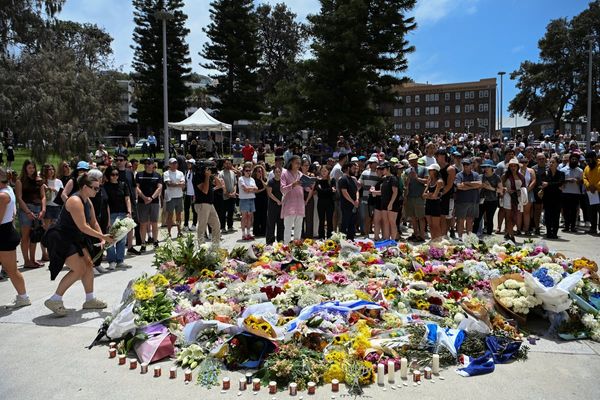
Presenter is in hospital after he was accused of sexually inappropriate behaviour with a young person
Huw Edwards is facing the end of his broadcasting career after he was named by his wife as the presenter at the centre of a sexual impropriety scandal that has dominated headlines.
The BBC figurehead is in hospital with “serious mental health issues”, said his wife Vicky Flind, after she named him as the presenter accused by The Sun of paying a young person for sexually explicit pictures. He was “suffering from serious mental health issues” and is “receiving inpatient hospital care”, she said, where he will “stay for the foreseeable future”. She said she was making the statement on his behalf “out of concern for his mental wellbeing and to protect our children”.
Two police forces have confirmed that there was no evidence of a criminal offence, and last night the Met Police ruled out any further investigation. The BBC said that police had previously asked them to pause their “fact-finding investigations” into Edwards’s actions, but that now they would “move forward with that work, ensuring due process and a thorough assessment of the facts, whilst continuing to be mindful of our duty of care to all involved”.
The veteran Welsh broadcaster is perhaps best known for heading up the BBC’s news coverage following Queen Elizabeth II’s death last year. In March, he signed a three-year contract to remain with the BBC. Now, “unexpectedly, almost fantastically, his survival at the BBC – in national life itself – is in real and involuntary jeopardy”, said Andrew Billen in The Times.
Who is Huw Edwards?
Edwards was born in Bridgend in Wales in 1961 and brought up in Llangennech, near Llanelli. His mother was a teacher and his father was a Plaid Cymru and Welsh language activist, author and academic of some renown. During an interview with former Downing Street spin doctor Alastair Campbell for Men’s Health magazine, Edwards said that his father “was absent most of the time when I was growing up”.
“When we did see him, he tended to be unbelievably tired and ratty,” he added.
Edwards was educated at Llanelli Boys’ Grammar School and studied French at Cardiff’s University College. After graduating with first-class honours, he became a reporter for local radio station Swansea Sound, before joining the BBC as a trainee in 1984.
Two years later, he became parliamentary correspondent for BBC Wales. A meteoric rise through the ranks followed. Edwards presented the BBC’s “Six O’Clock News” between 1999 and 2003, when it was the most watched news programme in Britain, before becoming the host of the “Ten O’Clock News” on BBC One.
“After years of promises and decades of David Dimbleby”, said The Times, Edwards “finally” hosted the 2019 general election coverage, and has since led on several major events. Edwards announced the death of Queen Elizabeth II, and his extensive coverage afterwards was widely praised as a masterclass in broadcasting, which “even the BBC’s least sympathetic critics” admired for his “sympathetic, authoritative commentary”. Edwards was the “face” of the BBC’s coverage – indeed, “for those sad weeks he was the BBC”.
He is married to TV producer Vicky Flind, who has worked on the BBC’s “This Week” and ITV’s “Peston”. They have five children together and live in Dulwich, London. “He loves and protects his home life,” wrote Billen.
Mental health battles
Edwards has battled depression for 20 years and has spoken candidly about how it has affected his career. His “melancholy is partly Welsh, a deeper, more existential thing”, wrote Billen, “and, as he approached 60, it threatened to become a full-blown mental health crisis.
“It’s not anxiety, although it includes anxiety, but it tends to hit me in a strong wave and then go away,” he told Campbell last year. “You come into work and obviously you do a professional job, but you’re kind of pushing your way through it,” he added.
Edwards said that after revealing his mental health issues, a colleague told him that the BBC “doesn’t want people to think there’s a nutter reading the 10 o’clock news”. Speaking on BBC Radio 4 podcast Fortunately… with Fi and Jane, Edwards claimed that he initially faced a “deep-freeze silence” from the corporation after going public about his depression.
He told Campbell that taking up boxing had helped him cope. “It’s one of the things I can do when I feel myself on the slide,” he said. “I can pull my way out of it.”







